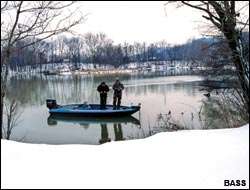
On a frigid winter morning in 1997, Mark Tucker made an hour-long run while fishing a Central Pro-Am tournament at Table Rock Lake. Although Tucker and his partner endured the ride in 17-degree weather, the outboard was not so fortunate. The carburetor on his engine stuck and kept revving at 5,000 rpms.
"I had a ball of ice around the cowling from the overspray that I couldn't have knocked off with a sledgehammer," said Tucker, a Bassmaster Elite Series pro from Missouri. The engine finally shut off, but it blew on the ride back down the lake.
Ohio pro Frank Scalish can recall some winter tournaments he has fished in which a snow shovel would have come in handy. "We had to scoop all the snow we could out of the boat because I was getting so much build-up," said Scalish.
Competitive bass fishing started out as a warm-weather venture, but Bassmasters now compete year-round and face the possibility of fishing in Arctic-like conditions. Fishing on a frigid, snowy day definitely turns off novices and fair-weather fishermen, but the Bassmaster Elite pros and savvy anglers north of the Mason-Dixon Line know they can be rewarded for braving the elements.
"I had one of the biggest smallmouth limits of my life (24 pounds) while fishing an ABA (American Bass Anglers) championship at Watts-Barr when it was 11 degrees," reminisces Scalish. And former Bassmaster Open competitor Skip Surbaugh fished a buddy tournament at Lake of the Ozarks this winter in 4-degree weather; and he and his partner landed a limit in 25 minutes and caught 23 keepers that day.
Subfreezing temperatures can be hard on your equipment, but with the proper preparations you can fish just as efficiently in the cold as you can in mild weather. Technological advances have made today's boats and motors more dependable in wintry conditions, however anglers still need to take some precautions to keep their equipment running smoothly.
"Routine maintenance is the key to success when fishing in cold weather," advises Luke Payne, owner of Pro's Choice Marine, a Triton boat dealership in Warsaw, Mo. "As long as you keep cables lubed, prevent the bilge pumps and livewells from freezing and keep the trailer bearings greased, you should be good to go for fishing in any climate."
Lubricating the steering cables and the outboard's lower unit are two standard maintenance procedures anglers should complete before fishing winter tournaments. J.D. Foster, a Mercury technician, recommends using a high performance gear lube, such as Quicksilver, which is a partial synthetic that lubricates and flows better in cold weather.
Keeping moisture out of the shift and throttle cables of the engine (and the foot pedal cable if you have one) will prevent icing problems during a cold tournament. "Spray the little boots on your cable linkages with a Teflon spray and it will keep those areas from freezing up," suggests Payne.
The boat dealer recommends adding a fuel stabilizer to the gas tank whenever temperatures drop below 40 degrees. "The gas will spoil in about 20 days and that can be a problem for guys who fish in the winter but don't run a lot," he discloses. "Customers tell us they've run the boat the last three weekends but it might have been for 2 or 3 minutes at a time. With today's fuel efficient engines, that is not enough time to pump much fresh gas into the engine."
Giving an engine plenty of time to warm up is another must in cold weather. "Some guys have said it takes a while for the engine to take throttle, and a lot of that is because the engine isn't warmed up and is running rich in the cold block," says Foster. The technician believes idling through no-wake zones of a tournament takeoff site is usually sufficient time to warm up the engine, but on extremely cold days it might be best to let the engine run while waiting for the takeoff.
Keeping the cranking and deep-cycle batteries well-charged will ensure that your outboard will start and your trolling motor will perform all day long in even the coldest weather. Payne recommends keeping your batteries filled with water to prevent them from freezing and bursting. You also can avoid this problem by paying a little more for maintenance-free gel batteries. Scalish keeps his batteries in good working order during the winter by tightening the battery leads and spraying them with a non-corrosive lubricant.
A gallon of environmentally safe RV antifreeze can prevent your boat's bilge pump system from freezing during a bitterly cold tournament. "Put about a half gallon in the bottom of the boat and run the pumps for a couple of seconds," advises Payne. "That saves a lot of cracked lines, cracked hoses and bilge pumps."
Storage compartment and livewell lids tend to freeze shut on winter days. Payne suggests spraying the storage lids with a de-icer to gain access to your tackle.
Towing your boat to and from the tournament also can be a problem if the trailer bearings freeze. "Most of the newer trailers have the oil bathtubs so it's not as big of an issue anymore," says Payne. "On the older model trailers, the bearings will freeze and lock up. If the bearings are kind of milky looking, they have mixed with water and should be replaced."
Freezing weather can wreak havoc on fishing tackle, as well, but the pros have some tricks for de-icing their gear. "I like to have two or three of the same rods with the same lure. That way I can switch off if one freezes up," says Tucker.
Dabbing Vaseline on his rod guides and the level wind of his baitcast reel minimizes icing on Surbaugh's gear. The Lake of the Ozarks guide also prevents his line from freezing by wiping silicone on it as he spools his reel.
"People like to dunk their rods in the water to get the ice off, but that's bad news because all you are doing is making them freeze twice as fast and twice as hard," cautions Scalish. The 2004 New York CITGO Bassmaster Open winner keeps his rods ice-free by applying fly fishing line coating on the guides. Spooling his line with a rag coated in Armor All also helps Scalish minimize icing problems.
Loose, worn-out reels with minimum grease work best for Tucker in freezing conditions. "The worst thing you can do is put oil on your reel before a cold day of fishing," he warns. "You will be sitting there with just 6 feet of line because the reel will gum up on you."
His days of ice fishing have taught Scalish how well his equipment can handle Arctic conditions. "How many problems do guys have ice fishing? They have their locators lying on the ice, their transducer is in the hole and nothing fails out there," said Scalish.
The same can be said about wintertime tournaments if a Bassmaster prepares his equipment properly.
Preparing yourself for the cold
"The key to winter fishing is staying warm and comfortable," advises Bassmaster Elite Series pro Frank Scalish.
Eating right gives anglers a head start to endure freezing weather.
"Having breakfast is a must," recommends Mark Tucker. "You have to have a full stomach to stay out there and fight off the cold." The Elite Series pro usually eats a bowl of oatmeal for breakfast.
While on the water, Tucker drinks plenty of water and takes the recommended dosage of Niacin vitamin pills (available at health stores), which he thinks helps warm the body. "If it is real cold and you are making one of those long runs, you can take a couple of those Niacins and you will stay warm the whole way."
Dress for success
The cold-weather experts also recommend the following tips for surviving a frigid-weather tournament.
1. Wear thin insulated layers of clothing and a survival float suit.
2. Keep your hands warm with wool gloves. Scalish also puts hand-warmer packs in the pockets of his shirt and coat. "That keeps your torso warm which will keep your hands warm," he says.
3. Wear wool socks and a pair of heavily insulated boots or high-top waterproof Merrell shoes.
4. Cover your head with a wool or fleece stocking cap.
5. Carry a complete set of extra clothes.





